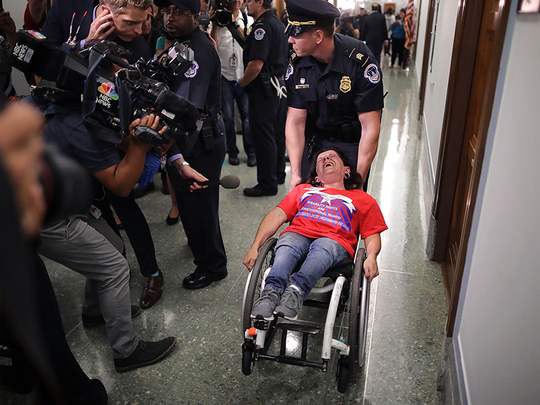
Washington: A last-ditch attempt by President Donald Trump and Senate Republicans to dismantle the Affordable Care Act appeared to collapse Monday as a pivotal senator announced her firm opposition to the latest repeal plan, virtually ensuring that Republicans would not have the votes they need for passage.
The announcement by the senator, Susan Collins of Maine, effectively dooms what had been a long-shot effort by Republicans in the Senate to make one more attempt at repealing the health law after failing in dramatic fashion in July.
The demise of the latest repeal push means that Republicans are now all but certain to conclude Trump’s first year in office without fulfilling one of their central promises, which the president and lawmakers had hoped to deliver on quickly after Trump took office.
For seven years, Republicans have said they would repeal President Barack Obama’s signature domestic achievement and replace it with a new health care system more palatable to conservatives. But they were never able to formulate a replacement that was both politically and substantively viable.
Collins, one of three Republican senators who opposed the last repeal attempt in July, described the latest plan as “deeply flawed.” She expressed concerns about cuts to Medicaid as well as the rolling back of protections for people with pre-existing medical conditions.
“Health care is a deeply personal, complex issue that affects every single one of us and one-sixth of the American economy,” Collins said in a statement, lamenting the rushed process and the content of legislation that has shifted as Republican leaders scrambled for votes. “Sweeping reforms to our health care system and to Medicaid can’t be done well in a compressed time frame, especially when the actual bill is a moving target.”
The Senate majority leader, Mitch McConnell of Kentucky, now faces the unpalatable choice of admitting defeat or moving ahead with a vote that appears certain to fail.
Republican leaders in the Senate can afford to lose only two of their members, and they now have three firm opponents within their ranks: Rand Paul of Kentucky, John McCain of Arizona and Collins. Additionally, Sen. Ted Cruz, R-Texas, has withheld his support and requested changes to the bill.
Time is not on their side: Republicans have only until the end of the month to pass the bill through the Senate while being protected from a Democratic filibuster. Beginning in October, Republicans would need Democratic votes in order to pass a repeal bill, a seeming impossibility given that Democratic senators have been unified in opposition to the repeal push.
Some Republican senators have suggested starting over, with parliamentary language in a new budget blueprint that once again would shield a repeal bill from a filibuster. But that could terribly complicate Republican efforts to overhaul the tax code, a risk the leadership may not want to take.
Collins’ announcement came three days after McCain said that he could not “in good conscience” support the latest repeal proposal, written by Sens. Lindsey Graham of South Carolina and Bill Cassidy of Louisiana.
“We’re going to press on,” Graham said hours later, during a Monday night CNN debate on health care. He raised the possibility of still holding a vote, even as he acknowledged it might fail: “It’s OK to vote. It’s OK to fall short, if you do, for an idea you believe in.”
The senators released a revised version of their bill Monday morning, hoping to win over holdout Republicans in part by shifting more funds to states like Alaska and Maine. The bill would take money provided under the Affordable Care Act for insurance subsidies and the expansion of Medicaid and send it to states, with vast new discretion over how to use it for health care or coverage.
But writing a repeal bill that could win over at least 50 of the 52 Republican senators has proved extraordinarily difficult, and putting together a complicated bill against the backdrop of a ticking clock only added to the challenge. Insurers, hospitals, doctors and patient advocacy groups assailed the proposal, as did late-night talk show host Jimmy Kimmel.
Republican senators had to make up their minds with little information about the measure’s implications.
The non-partisan Congressional Budget Office said Monday that “millions of additional people would be uninsured” under the Graham-Cassidy bill, compared with the number of people expected to lack coverage under current law.
“Enrolment in Medicaid would be substantially lower because of large reductions in federal funding for that program,” the budget office said.
But the budget office said it did not have time to produce a more complete assessment, leaving senators without specifics on how the bill would affect coverage and health insurance premiums.
The rushed process contributed to the bill’s demise.
McCain, who killed the last repeal effort in July with a dramatic middle-of-the-night vote, faulted Republicans for trying to pass sweeping health care legislation without the participation of Democrats or extensive public deliberations.
Paul had previously said he would oppose the Graham-Cassidy bill because it did not go far enough in repealing the health law. On Monday, he continued to denounce it as a “fake repeal.”
Paul presented himself as open to compromise, voicing support for a narrower measure. But he rejected the Graham-Cassidy bill’s core concept of providing block grants to the states to use for health care — leaving little room for Republican leaders to win his vote unless they radically altered the legislation
“I think if you vote for this bill, you put your stamp of approval on a trillion dollars’ worth of Obamacare spending,” he said.
Paul was not the only conservative with reservations. Cruz said Sunday that he had not yet been won over and was seeking changes to the repeal plan, though he said he wanted to ultimately wind up in favour of the bill. An aide to Cruz said Monday that the senator still wanted to see changes.
Before Collins’ announcement Monday, Trump expressed frustration that Republicans had talked for years about repealing and replacing the Affordable Care Act but failed to deliver now that a Republican was in the White House.
On the “Rick & Bubba Show,” a radio program, Trump singled out McCain, calling his vote in July “a tremendous slap in the face of the Republican Party.” And the president seemed resigned to defeat in the latest attempt at repeal.
“We’re going to lose two or three votes,” he said, “and that’s the end of that.”












